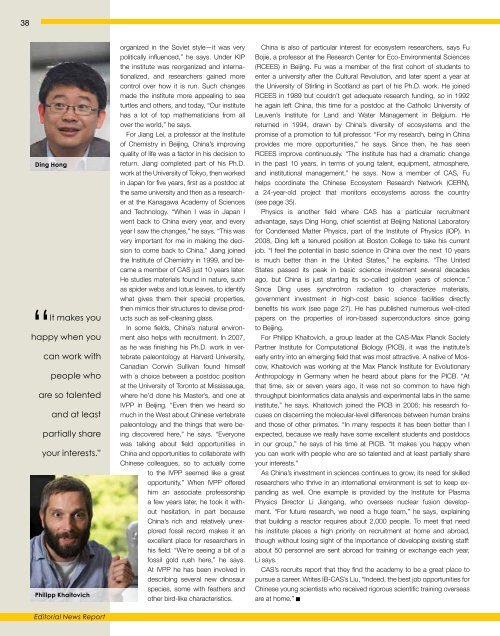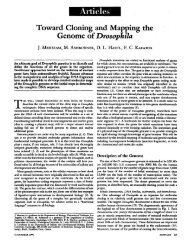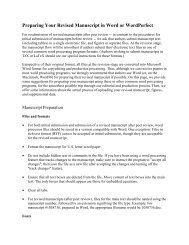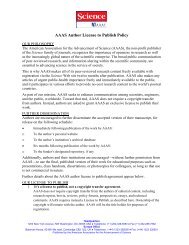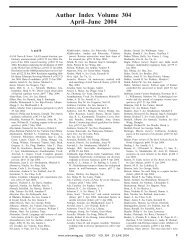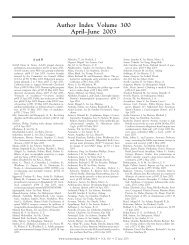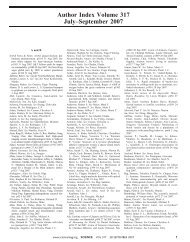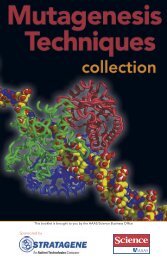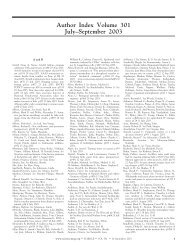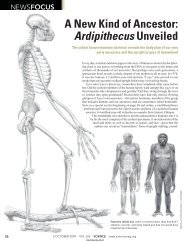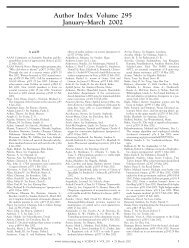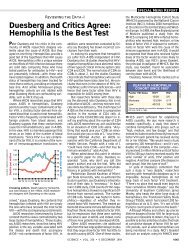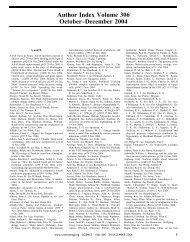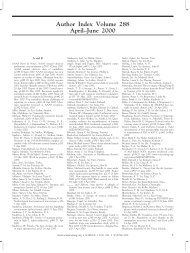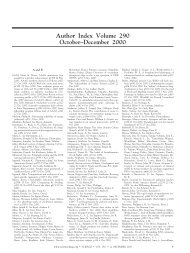Chinese Academy of Sciences (PDF) - low res version
Chinese Academy of Sciences (PDF) - low res version
Chinese Academy of Sciences (PDF) - low res version
You also want an ePaper? Increase the reach of your titles
YUMPU automatically turns print PDFs into web optimized ePapers that Google loves.
38<br />
News Report<br />
Ding Hong<br />
“It makes you<br />
happy when you<br />
can work with<br />
people who<br />
are so talented<br />
and at least<br />
partially share<br />
your inte<strong>res</strong>ts.”<br />
Philipp Khaitovich<br />
Editorial News Report<br />
organized in the Soviet style—it was very<br />
politically influenced,” he says. Under KIP<br />
the institute was reorganized and internationalized,<br />
and <strong>res</strong>earchers gained more<br />
control over how it is run. Such changes<br />
made the institute more appealing to sea<br />
turtles and others, and today, “Our institute<br />
has a lot <strong>of</strong> top mathematicians from all<br />
over the world,” he says.<br />
For Jiang Lei, a pr<strong>of</strong>essor at the Institute<br />
<strong>of</strong> Chemistry in Beijing, China’s improving<br />
quality <strong>of</strong> life was a factor in his decision to<br />
return. Jiang completed part <strong>of</strong> his Ph.D.<br />
work at the University <strong>of</strong> Tokyo, then worked<br />
in Japan for five years, first as a postdoc at<br />
the same university and then as a <strong>res</strong>earcher<br />
at the Kanagawa <strong>Academy</strong> <strong>of</strong> <strong>Sciences</strong><br />
and Technology. “When I was in Japan I<br />
went back to China every year, and every<br />
year I saw the changes,” he says. “This was<br />
very important for me in making the decision<br />
to come back to China.” Jiang joined<br />
the Institute <strong>of</strong> Chemistry in 1999, and became<br />
a member <strong>of</strong> CAS just 10 years later.<br />
He studies materials found in nature, such<br />
as spider webs and lotus leaves, to identify<br />
what gives them their special properties,<br />
then mimics their structu<strong>res</strong> to devise products<br />
such as self-cleaning glass.<br />
In some fields, China’s natural environment<br />
also helps with recruitment. In 2007,<br />
as he was finishing his Ph.D. work in vertebrate<br />
paleontology at Harvard University,<br />
Canadian Corwin Sullivan found himself<br />
with a choice between a postdoc position<br />
at the University <strong>of</strong> Toronto at Mississauga,<br />
where he’d done his Master’s, and one at<br />
IVPP in Beijing. “Even then we heard so<br />
much in the West about <strong>Chinese</strong> vertebrate<br />
paleontology and the things that were being<br />
discovered here,” he says. “Everyone<br />
was talking about field opportunities in<br />
China and opportunities to collaborate with<br />
<strong>Chinese</strong> colleagues, so to actually come<br />
to the IVPP seemed like a great<br />
opportunity.” When IVPP <strong>of</strong>fered<br />
him an associate pr<strong>of</strong>essorship<br />
a few years later, he took it without<br />
hesitation, in part because<br />
China’s rich and relatively unexplored<br />
fossil record makes it an<br />
excellent place for <strong>res</strong>earchers in<br />
his field. “We’re seeing a bit <strong>of</strong> a<br />
fossil gold rush here,” he says.<br />
At IVPP he has been involved in<br />
describing several new dinosaur<br />
species, some with feathers and<br />
other bird-like characteristics.<br />
China is also <strong>of</strong> particular inte<strong>res</strong>t for ecosystem <strong>res</strong>earchers, says Fu<br />
Bojie, a pr<strong>of</strong>essor at the Research Center for Eco-Environmental <strong>Sciences</strong><br />
(RCEES) in Beijing. Fu was a member <strong>of</strong> the first cohort <strong>of</strong> students to<br />
enter a university after the Cultural Revolution, and later spent a year at<br />
the University <strong>of</strong> Stirling in Scotland as part <strong>of</strong> his Ph.D. work. He joined<br />
RCEES in 1989 but couldn’t get adequate <strong>res</strong>earch funding, so in 1992<br />
he again left China, this time for a postdoc at the Catholic University <strong>of</strong><br />
Leuven’s Institute for Land and Water Management in Belgium. He<br />
returned in 1994, drawn by China’s diversity <strong>of</strong> ecosystems and the<br />
promise <strong>of</strong> a promotion to full pr<strong>of</strong>essor. “For my <strong>res</strong>earch, being in China<br />
provides me more opportunities,” he says. Since then, he has seen<br />
RCEES improve continuously. “The institute has had a dramatic change<br />
in the past 10 years, in terms <strong>of</strong> young talent, equipment, atmosphere,<br />
and institutional management,” he says. Now a member <strong>of</strong> CAS, Fu<br />
helps coordinate the <strong>Chinese</strong> Ecosystem Research Network (CERN),<br />
a 24-year-old project that monitors ecosystems across the country<br />
(see page 35).<br />
Physics is another field where CAS has a particular recruitment<br />
advantage, says Ding Hong, chief scientist at Beijing National Laboratory<br />
for Condensed Matter Physics, part <strong>of</strong> the Institute <strong>of</strong> Physics (IOP). In<br />
2008, Ding left a tenured position at Boston College to take his current<br />
job. “I feel the potential in basic science in China over the next 10 years<br />
is much better than in the United States,” he explains. “The United<br />
States passed its peak in basic science investment several decades<br />
ago, but China is just starting its so-called golden years <strong>of</strong> science.”<br />
Since Ding uses synchrotron radiation to characterize materials,<br />
government investment in high-cost basic science facilities directly<br />
benefits his work (see page 27). He has published numerous well-cited<br />
papers on the properties <strong>of</strong> iron-based superconductors since going<br />
to Beijing.<br />
For Philipp Khaitovich, a group leader at the CAS-Max Planck Society<br />
Partner Institute for Computational Biology (PICB), it was the institute’s<br />
early entry into an emerging field that was most attractive. A native <strong>of</strong> Moscow,<br />
Khaitovich was working at the Max Planck Institute for Evolutionary<br />
Anthropology in Germany when he heard about plans for the PICB. “At<br />
that time, six or seven years ago, it was not so common to have high<br />
throughput bioinformatics data analysis and experimental labs in the same<br />
institute,” he says. Khaitovich joined the PICB in 2006; his <strong>res</strong>earch focuses<br />
on discerning the molecular-level differences between human brains<br />
and those <strong>of</strong> other primates. “In many <strong>res</strong>pects it has been better than I<br />
expected, because we really have some excellent students and postdocs<br />
in our group,” he says <strong>of</strong> his time at PICB. “It makes you happy when<br />
you can work with people who are so talented and at least partially share<br />
your inte<strong>res</strong>ts.”<br />
As China’s investment in sciences continues to grow, its need for skilled<br />
<strong>res</strong>earchers who thrive in an international environment is set to keep expanding<br />
as well. One example is provided by the Institute for Plasma<br />
Physics Director Li Jiangang, who oversees nuclear fusion development.<br />
“For future <strong>res</strong>earch, we need a huge team,” he says, explaining<br />
that building a reactor requi<strong>res</strong> about 2,000 people. To meet that need<br />
his institute places a high priority on recruitment at home and abroad,<br />
though without losing sight <strong>of</strong> the importance <strong>of</strong> developing existing staff:<br />
about 50 personnel are sent abroad for training or exchange each year,<br />
Li says.<br />
CAS’s recruits report that they find the academy to be a great place to<br />
pursue a career. Writes IB-CAS’s Liu, “Indeed, the best job opportunities for<br />
<strong>Chinese</strong> young scientists who received rigorous scientific training overseas<br />
are at home.”


